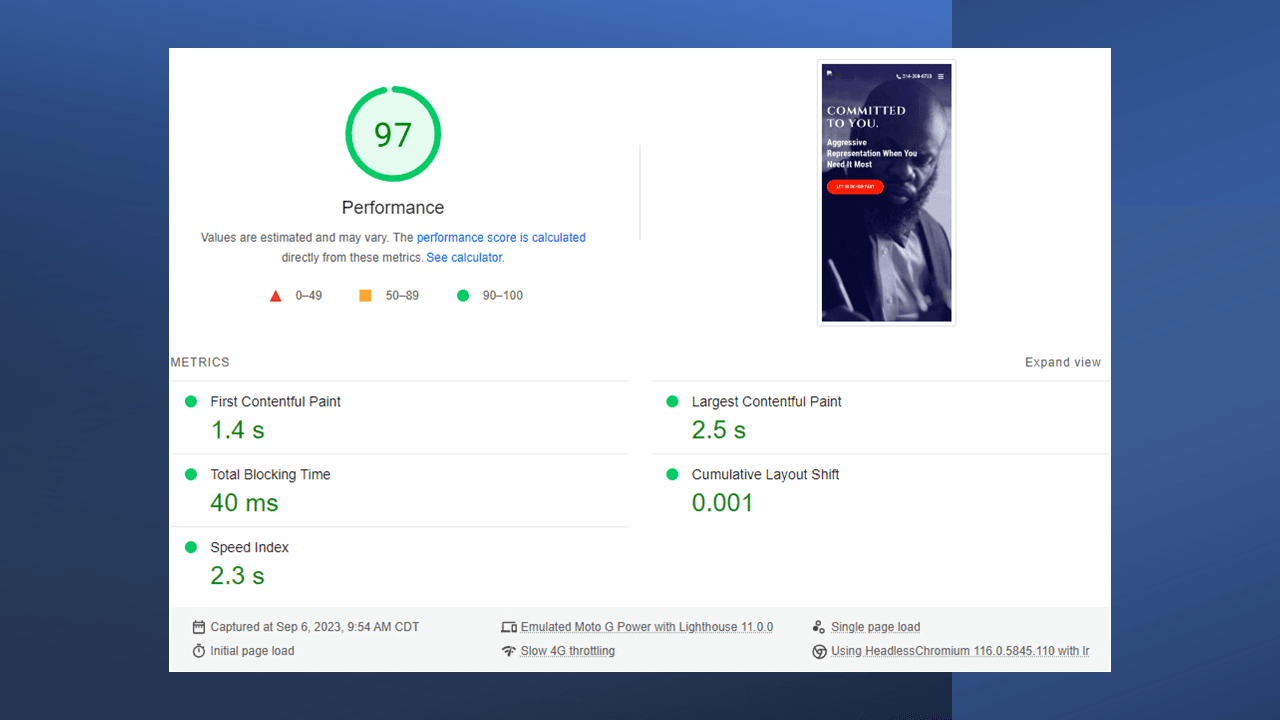Why is Page Speed Important for Law Firm Websites?

Essentially since its inception, there has been a battle taking place on the Internet. It’s the battle between having a great website with a lot of functionality and having a fast website that will load in a few seconds. Does page speed still matter though?
When Civille was first formed, most of us came from the automotive industry where SEO competition is fierce and websites are expected to have a lot of functionality with dozens of forms, hundreds of inventory listings, potentially thousands of images, and complicated integrations. When we broke out into building law firm websites, we were stunned at how these complicated automotive websites that we helped build were faster than many simple law firm websites often with less than a dozen pages.
We found that there was a disconnect. Where other industries have been fighting for ranking and chasing best SEO practices for decades, most in the legal space just wanted a nice website. That line of thinking is changing. The words “ranking factor” are more common in marketing meetings and law conferences, but the ranking factor that too often gets ignored is page speed.
Does Page Speed Matter To Users?
Even with vastly improved connection speeds in the past couple of decades, websites have only become more complicated with video, animations, detailed images, integrations, and more. Without optimization, even a simple page can take several seconds to load when it could be loading much faster. Do those seconds really matter though?
Those seconds will matter to users, especially on mobile. If it takes too long to load, they may click away to another option. When a user clicks away after already selecting your site from the search results, it’s a wasted opportunity. You already had them. Your site was ranking high enough and the information that surfaced through the search was enticing enough to warrant a click. Now that potential lead is frustrated and just went back to their search and found one of your competitors. It doesn’t take much to lose a potential client especially when they are early in the process.
Does Page Speed Matter to Search Engines?
Google has confirmed that since 2010, page speed has been an important ranking factor, and with more and more people browsing via mobile devices, it isn’t expected to go away anytime soon. To assist site owners in determining page speed and identifying issues, Google has its own tool called PageSpeed Insights. With this tool, users can check the page speed scores of any page for both mobile and desktop.
In the old days of business, the saying was always location, location, location. That saying might actually still ring true, but the location you should be vying for isn’t necessarily on Main Street, but rather in the top spots of the search results for Google and other search engines.
If you’re not on page one, you’re done. On average, the top organic result below any ads gets clicked 39.8% of the time. That percentage drops down to 18.7% by the second result and by the time you are at position 5, the percentage is already at 5%. It only gets worse from there.
Having a low page speed score can actually hurt you in two ways. Page speed is a direct ranking factor, but a low score can increase your bounce rate. Of course, bounce rate is another direct ranking factor. By having a low page speed score, you may have two direct ranking factors working against you.
There are lots of search engines out there including Bing, Yahoo, DuckDuckGo, and more, but Google is the most used search engine in the U.S. by a wide margin at over 60%. It is often used as a standard. Though Bing is on the rise, for well over a decade, every search engine has followed Google’s lead to some extent or another.
How Do You Improve Page Speed?
It’s an unfortunate truth, but much of your page speed is driven by the platform that your law firm’s website is built on. Not to use an automotive analogy, but no matter how hard you try to optimize it, a Suburban isn’t going to beat a Ferrari. There are still slow Ferraris and there are probably a few tricked-out Suburbans that can get up and go, but each is still bound to the limitations and advantages of their respective platforms.
There are a lot of ranking factors in all. Your content, your use of meta descriptions and titles, your sitemap, how your site is laid out, URL structure, and the list goes on. What all of those things have in common is that all those issues can be easily fixed while page speed is often driven by your platform.
A well-built platform will ensure that your time to first contentful paint (FCP) — how long it takes before your website loads anything — and your time to largest contentful paint (LCP) — how long it takes for all or most of your page to load — are both as low as possible. With a fast page speed, you will get your information to the user quicker, increase page views, reduce bounce rate, and increase on-site conversions.
A good mobile page speed time — as determined by the Google PageSpeed Insights tool — should be as low as 1.5 seconds for FCP and 2.5 seconds for LCP. To achieve that, the platform has to rely on a minimal amount of JavaScript, use proper image sizes and formats, enable text compression, reduce unused CSS, and do a host of other tricks including deferring offscreen content.
When shopping for a new law firm website provider, you need to ensure that you are going with a provider that prioritizes page speed and utilizes best SEO practices. That’s the first step in climbing to the top of any search results page.
